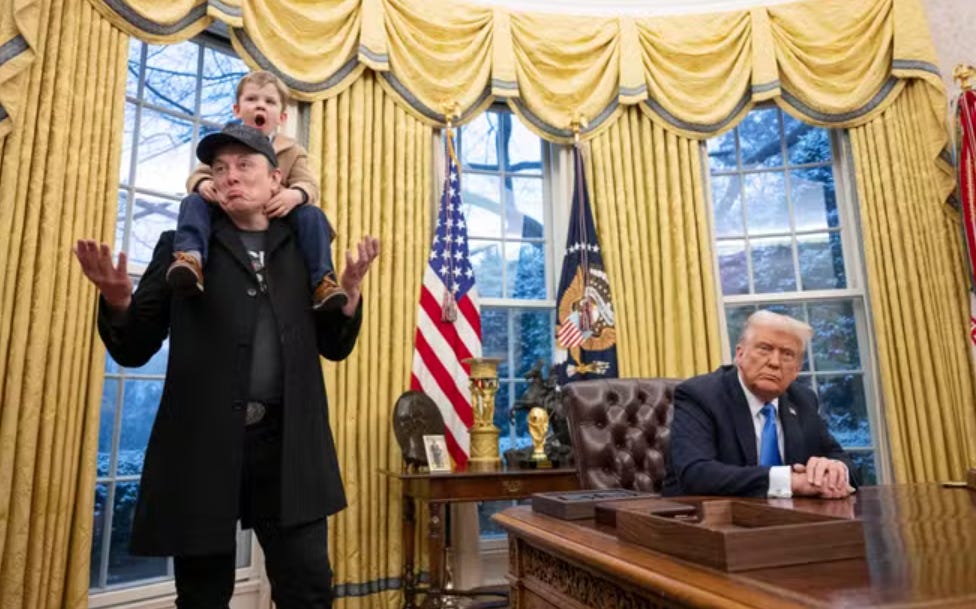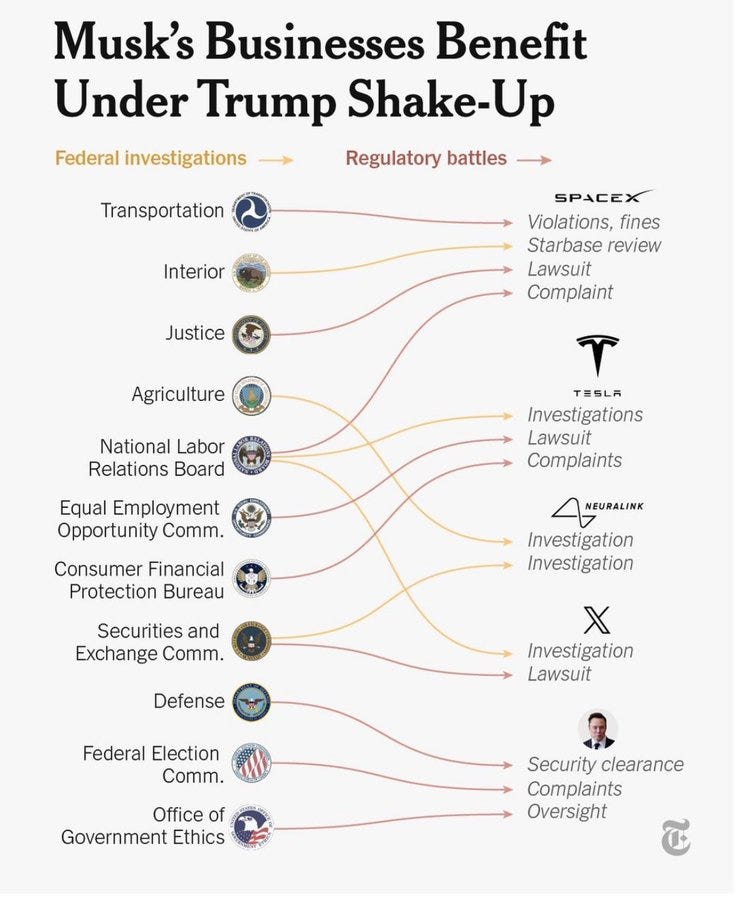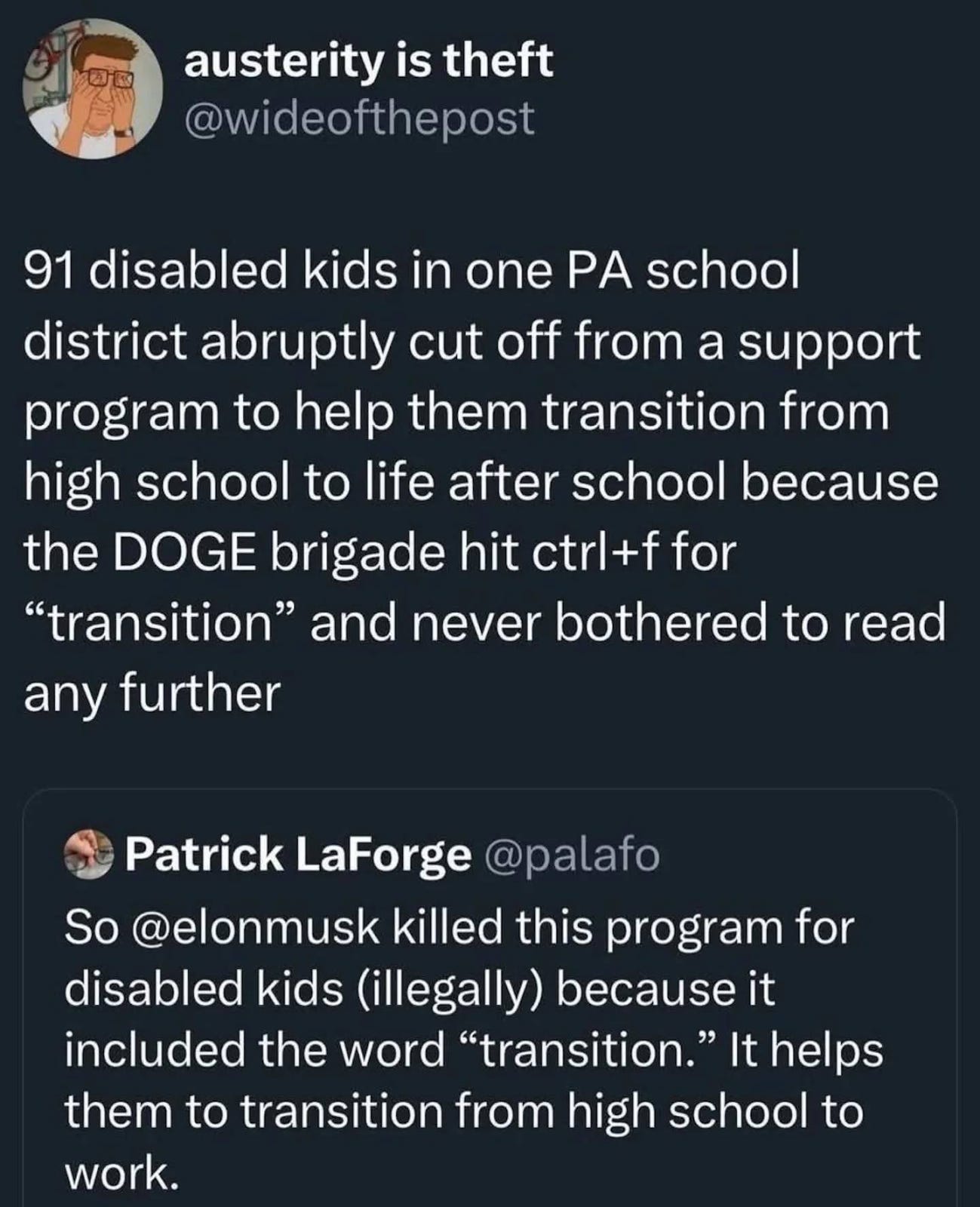One of the best explanatory modern American political ideas I've heard recently is that the Democrat party stumbled their way into being defenders of the status quo, government as usual, and sending the message loud and clear "Nothing is broken. Everything is fine." This gaslighting is what led to their defeat. (Ultimately, being beholden to their corporate donor class requires them to shape their message to appease that class. And that class is invested in, and profits from the status quo. The math is not complicated.)
So when people like me are raising red flags about the bull in the China shop, the conservative side says "good." They want the broken system to be demolished, so it can be rebuilt in a way that fits their ideology. (Wouldn't we all?) But our warnings are not based on being precious about the status quo, or loving tax dollars wasted, or thinking Democrats are good.
MY particular take is that the biggest problem with the current approach that the administration (Musk/Trump) is taking towards their… everything, -but especially this strange form of government audit- is that they are using the phrase “common sense” as both a decision-making criteria and a fig leaf for what boils down to ‘doing whatever they want’.
I’ve complained about the concept of common sense many times, but let’s see if I can summarize it. ‘Common sense’, as a concept, has very limited applications. And it does not make sense once you apply ANY level of scrutiny to it. It’s ‘common sense’ that if you are nice to people, they are usually nice back. But It’s also ‘common sense’ that a heavy object will fall faster than a light object. It’s also common sense that the sun “rises” and “sets”. We have to be educated to accept that the sun is not rising or setting, but that the earth is spinning, and both the sun and earth are on a spiral trajectory hurtling through space.
Importantly, ‘common sense’ does us almost no good in any field that requires training. (Sometimes an outsider perspective can help when a person or system is incuriously reproducing bad outcomes.) But I can’t apply my common sense to managing a sports team because I don’t know enough about that profession. I see this from the other side all the time. People criticizing games will say stuff like “Why don’t you just X?” Rebalance the ranger traps. Add doors. Remove the encumbrance system. The word “just” is always the give-away. It’s the proxy for ‘common sense’. The implication being that we silly game developers hadn’t even considered doing something a different way. A ‘common sense’ way. Or, more nefariously, we purposefully did it badly because we are greedy, lazy, woke, etc. ‘Common sense’ leaves no room for the REASONS things are done or not done, based on ramifications that aren’t immediately apparent to those who don’t have training or experience in a field.
It’s this misapplication of ‘common sense’ to governmental system reform that I’m seeing on display right now. Forensic accounting is a field that requires many years to learn, and, like all fields, many more years to actually get good at. And to understand the specifics of governmental forensic accounting: probably a lot of experience in government. To think that anyone without such training can just ‘common sense’ their way through the process is a massive dose of Dunning-Kruger. (The phenomenon where someone with no understanding of a thing assumes they can do it just as well as a professional, whereas people actually trained in that thing assume they don’t know it as well as they could.)
When it comes to Monday-morning-quarterbacking (a person who unfairly criticizes or questions the decisions and actions of other people after something has happened.) this application of the Dunning-Kruger effect is mostly harmless. But when it’s people with real power, pretending that they are competent in a field they have no training in, that’s where the harm begins. Now imagine this risk, but magnified by time pressure, legal gray areas, the stress of public pressure and outcry, the chaos of not knowing who you actually report to. And in the case of this particular topic, being a 19-25 year old guy suddenly handed the reins to make countless “common sense” adjudications in a system you’ve never seen before, using unproven tools like AI to assist.
If there’s any appeal to ‘common sense’ I’ll make it right here. Given the above, it seems like ‘common sense’ that this is going to lead to multiple disasters. (Such as this apparently massive data security and infrastructure breach)
I think a mistake that people who tend to be supportive of this soft coup are making is that they think the people upset about it are upset because we like government waste and don't want any oversight or forensic accounting done. They think if Elon isn't doing it, then it won't or can't be done.
In other words, they don't understand that we all share the same goal (We all want our tax dollars spent wisely and democratically) and they don't seem to indicate that they understand that mechanisms for this already exist. If this is a serious enough issue (which I think we all agree it is) then ideally the existing democratic solutions should be examined, increased, made more transparent and publicized better. All things I'm in favor of. Having a billionaire with skin in the game calling the shots in a rushed, sloppy 'common sense' approach is not democratic, transparent, or informed by best practices in a field he is not trained in.
Jason Pargin just dropped this little cultural explainer that I think illustrates why so accept this framework as necessary. https://www.facebook.com/jasondavidwongpargin/videos/1303888690759700
What we who are alarmed are concerned about is the MECHANISM, not the goal. We are alarmed because we recognize that ‘common sense’, -even if we take the presidents at their word- is not an adequate tool for this job. We are alarmed that the person in charge of it stands to gain from making certain decisions, and is almost completely protected from the consequences of making life-and-death decisions for people around the world.
Maybe you fundamentally disagree with the idea of building our nation’s soft power around the world through acts of charity, infrastructure investments and stability. Maybe you believe that everything federal funding is doing, should instead be done locally. Great. Here’s some common sense questions. Who should be coordinating the transition from one department to another? Who should be overseeing the democratic process of each local district securing the funds? Who should ensure that innocent kids, disabled and the elderly who already have an incredibly up-hill battle in life don't fall between the cracks during that process? Is that something DOGE should be ensuring? Is a ‘break everything’ mechanism the right way to handle this when lives are on the line?
There are literally babies and young mothers in our country and around the world who are dependent on our aid to stay alive. You can argue this should have never been the case. Fine. Are you ok with their deaths that will come from a sudden removal of support? I’m not.
https://firstfocus.org/update/usaid-saves-childrens-lives/
There are sane ways to democratically and methodically examining and reforming the way our tax dollars are used. I know zero people who are not in favor of that happening. But that process is about applying a massive amount of experienced, trained professionals who don’t have intrinsic financial incentives to drive that process one way or another. (Or, off a bridge in a flaming cybertruck like Elon is doing now.) The ‘common sense’ in using the right tool for the job seems incredibly obvious to me.







